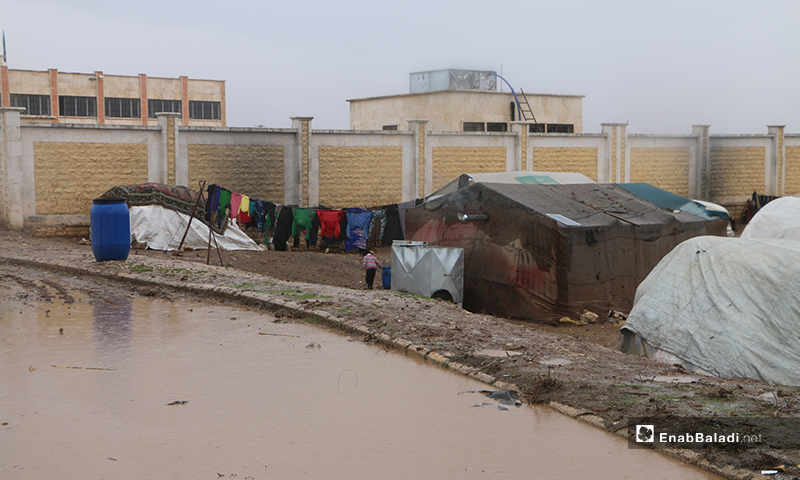



Aleppo countryside-Walid Othman
Ahmad al-Hilal, 45 years old, lives in al-Zaytoun camp, hosting nearly 700 displaced families in the district of Azaz in the northern countryside of Aleppo. Al-Zaytoun camp’s residents are battling with worsening living conditions, poor essential health care services and minimal attention to infrastructure and sanitation.
Al-Hilal, commenting on the familiar sight of domestic wastewater flowing across the camp, said that the residents are struggling with the dysfunctioning sanitation system, causing them dire health outcomes, such as skin diseases, especially during summer.
Al-Hilal and other residents called upon the NGOs operating in the area and the local council to address this problem. However, all their pleas fall on deaf ears.
In addition to the deficient sanitation system, the populations of informal camps in the district have to suffice with almost nonexistent healthcare services.
Dozens of such informal camps are dispersed randomly across the areas surrounding the district and up to the Syrian-Turkish border. They are equipped with no medical points or health centers.
Residents of these camps have to walk at least 3.1 miles to reach the nearest medical center in the area, said Shaker al-Abd, who lives with his family and relatives in the Shaker camp, one of the informal camps on the outskirts of the Azaz area.
In addition to distance, the residents of the Shaker camp have to put up with costly transportation fees from the camp to nearby hospitals in the area, Shaker al-Abd told Enab Baladi.
Remembering one health emergency at the camp, Shaker al-Abed said residents once had to transport an elderly heart patient on an agricultural tractor because there were no ambulances to transport him or a nearby medical point.
Ambulances cannot reach camp residents as fast as needed because the roads leading to the camps are muddy, especially in winter due to the rainfalls. Besides, these camps are set on agricultural lands, which are not fit for housing purposes.
The camp residents need vital healthcare services, Muhammad al-Obeid, one of the Shaker camp residents, told Enab Baladi.
They need blood pressure monitors, blood pressure testing machines, and medical nebulizers. According to al-Obeid, these machines should always be available because they help detect the patient’s condition before it escalates.
Due to the lack of these basic machines, one of the residents who volunteered to help a patient made a mistake that could have led to his death. He thought that the patient was suffering from low blood pressure while he was experiencing high blood pressure. So he gave him some salt, which worsened his condition further.
The health directorate of Azaz City Local City Council is seeking to find a solution by providing health services to the entire population of the area, both displaced and residents, the council’s health director, Muhammad Laqhini, told Enab Baladi.
“But the council’s health directorate is unable to establish a medical point in every random camp because they are numerous and set up far from each other,” said Laqhini.
The directorate sometimes tries to provide necessary medical services by sending a mobile medical clinic to the camps with no health centers.
Laqhini added that the directorate has set up a hotline for emergency situations, which can be used by the camp residents when needed.
He stressed that the alarming situation in the area requires a radical solution, noting that the health directorate does not have the capacity to provide all squatter camps with medical points.
if you think the article contain wrong information or you have additional details Send Correction